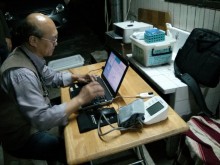As part of the Social Innovation Research Group (SIRG) I had the exceptional opportunity to join Professor Joseph Wong on a field visit as part of his research. We met with government officials, frontline workers, and patients to uncover why Taiwan’s aborigines experience lower life expectancy, much like in Canada. The field research took place during the few days prior to our big conference. (Though, we weren’t expecting two of our panelists to back out at the last minute, while one of our teammates was stranded in China.)
We learned just how respected Professor Wong is through our first meeting. We had a fairly frank conversation with the Director-General of Taiwan’s National Health Insurance. The meeting took place in Taipei, just a couple hours before we flew to our field visits in Hualien. Our first question aimed at the heart of the issue: Why are indigenous populations more likely to have an unhealthy lifestyle? We learned that it was a cultural issue. It’s not that they’re unaware – they know the risks associated with alcoholism and chewing betel nut – but they’d rather enjoy the moment. Vague memories from my anthropology tutorial percolated in my mind: trying to “develop” a group’s culture struck me as ethnocentric. (Funny enough, that tutorial was led by Katherine MacIvor, who’s currently the Program Administrator of the Asian Institute at the Munk School.)
But as we met the frontline health-givers and the officials actually based out of Hualien, where many of the aboriginal populations are located, culture was no longer referenced as a root cause. In fact, we heard quite the opposite. Historically, the local aborigines only rarely engaged in drinking. Alcoholism only plagued their communities after two cultural upheavals: first at the hands of Japanese colonialists and then by the Chinese Koumintang. And when officials at homebase see aggregated data suggesting liver damage as a leading cause of death, they attribute it to alcoholism and not the high levels of hepatitis.
Upon reflection, it was a fascinating experience in that it revealed more than just aboriginal issues. In some ways, it was as revealing of how knowledge diffuses through governmental ranks and bureaucracy in general. As we worked our way down the organization hierarchy, my perception of the problem completely transformed from heuristic to specific. I began with a superficial understanding of a lackadaisical culture and left with a more nuanced view of a problem steeped in colonialism and marginalization.
By day, Reza Mirza (recent U of T grad) is a cofounder of the Social Innovation Research Group in Taiwan and a strategist that’s consulted for Fortune 500s. By night, he skulks the city streets in search of street food, from quail heart to BBQ squid.
